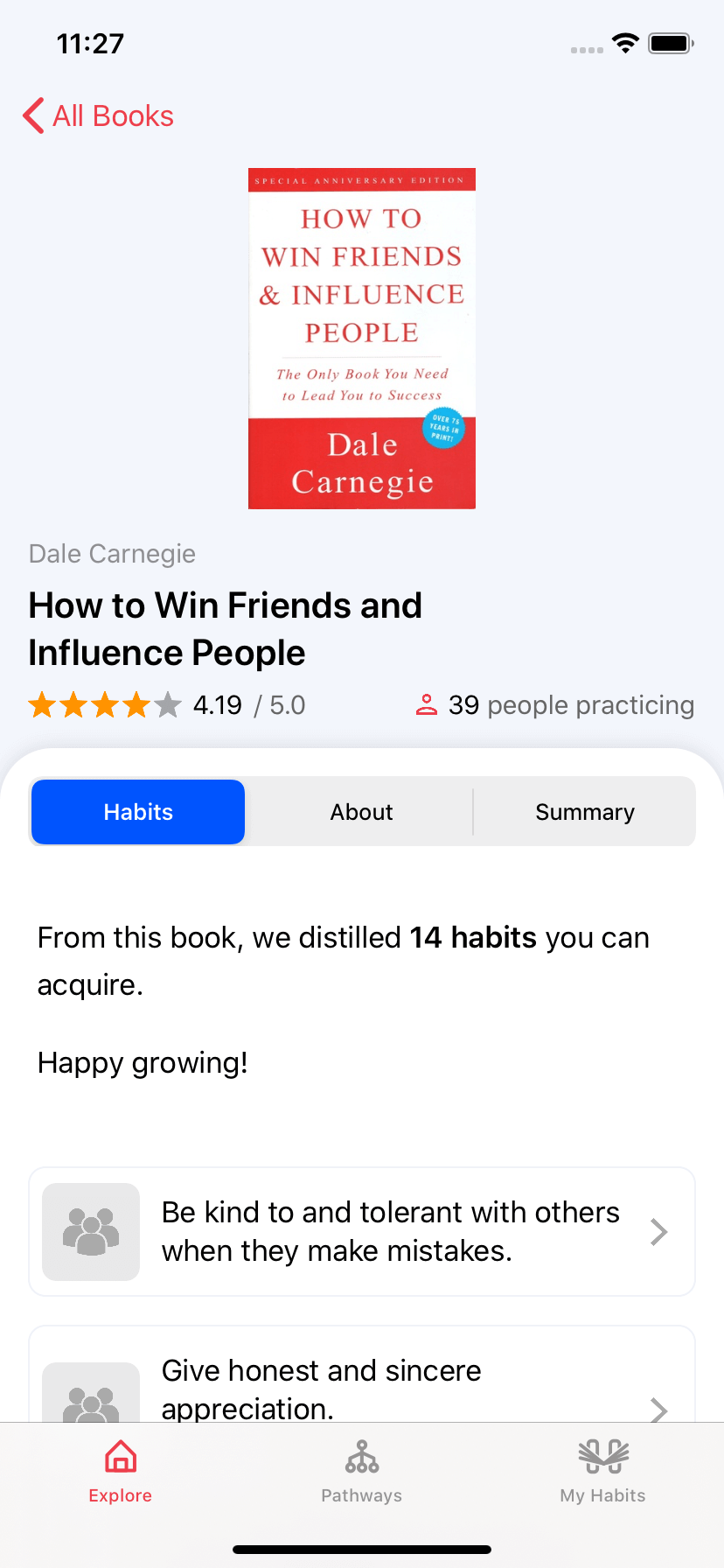
How to Win Friends and Influence People
by Dale CarnegieThe title says it all—this book will teach you how to win friends and influence people. As relevant today as they were when the book was first published in 1936, acclaimed author Dale Carnegie’s principles have endured the test of time. If you want to become a better leader, improve your relationships with others, or even learn to win others over to your way of thinking, this is the book for you!
Introduction
Knowing how to understand another person is a difficult art. Sometimes one wrong word can destroy a long-term friendship, while a well-chosen one can make you unforgettable.
Each of us wants to feel important, relevant, and appreciated. And everyone is afraid of humiliation, defeat, and shame. If you make others feel important and confident when they are around you, then you’ll be able to bring them together.
Don't Judge Others, Start with Yourself
“Don’t complain about the snow on your neighbor’s roof, when your own doorstep is unclean.” - Confucius
Criticizing others is pointless because it forces them to defend themselves and usually causes us to justify ourselves. It is dangerous because it hurts their pride and sense of value and arouses resentment. When we criticize others, we don’t change them. Instead, we often cause permanent injury. Resentment and dislike due to criticism can only demoralize family members, friends, and employees; they cannot change what has already happened.
Any fool can criticize, complain, and condemn, but it takes character and self-control to be forgiving and understanding. Instead of criticizing people, try to understand them. Try to figure out why they behave the way they do. This is much better than condemning. It breeds tolerance, sympathy, and kindness.
Actions to take
The Big Secret of Dealing with People
“I consider my ability to arouse enthusiasm among my people...the greatest asset I possess, and the way to develop the best that is in a person is by appreciation and encouragement.” - Charles Schwab
Appreciation and praise rarely find expression in our daily lives. We must not forget that we are all human, and we crave appreciation. People need recognition! Leave a trail of gratitude in your wake.
Like a river that is constantly flowing, you will pass through this situation and point in time only once. So take advantage of it! Show kindness and strive to do good now because you may not have the opportunity in the future.
Actions to take
To Understand Others
“People who can put themselves in the place of other people, who can understand the workings of their minds, need never worry about what the future has in store for them.” - Owen D. Young
To influence people, you must understand the other person’s point of view. You cannot only focus on yourself. Instead, talk about what others want and show them how to achieve it. You can win the attention, time, and cooperation of even the most sought-after people by becoming genuinely interested in them.
If you want to make friends, you should start by doing things for others. These should be things that require energy, time, thought, and are not selfish. You should greet people with enthusiasm and animation, even if your interaction is only on the phone. And smile! You should always smile at others! Remember, “it happens in a flash and the memory of it sometimes lasts forever.”
Actions to take
If You Don’t Do This, You Are Headed for Trouble
“One way to warm it up is to remember people’s names. The executive who tells me he can’t remember names is at the same time telling me he can’t remember a significant part of his business and is operating on quicksand.” - Benton Love
One of the most important ways to gain goodwill is by remembering names—making people feel important and showing them respect. You must realize that the name and surname are wholly owned by the person you are speaking to. The surname and first name distinguish an individual from others. It is what makes somebody unique and unrepeatable. You should remember that a person’s name is, to that person, the most important sound in any language!
Actions to take
You Can’t Win an Argument
“If you argue and rankle and contradict, you may achieve a victory sometimes; but it will be an empty victory because you will never get your opponent’s goodwill.” - Ben Franklin
To get the best of an argument is to avoid it. As Buddha said, “Hatred is never ended by hatred, but by love.” Misunderstandings will never be resolved in dispute, but only through tact, diplomacy, conciliation, and a sincere desire to understand the other person's point of view.
Bear in mind some advice from an article from The Economic Press titled “Bits and Pieces”. It provides concrete steps to ensure that a disagreement does not turn into an argument: distrust your first instinctive impression, welcome disagreement, control your temper, look for areas of agreement, listen first, thank your opponents sincerely for their interest, promise to think over your opponents’ ideas and study them carefully, and postpone action to give both sides time to think through the problem.
Actions to take
If You Are Wrong, Admit It
“If you are wrong, admit it quickly and emphatically.” - Dale Carnegie
The courage to admit your mistakes gives a lot of satisfaction. It clears the air of guilt and often helps solve the problem created by these errors. It is not an art to try to defend our mistakes. The trick is to admit them. It gives one a feeling of nobility and exultation, a sense of being better. So, if you are wrong, you should admit it quickly and clearly. If it's too late to do it quickly, at least do it emphatically.
Actions to take
What Everybody Wants
“Three-fourths of the people you will ever meet are hungering and thirsting for sympathy. Give it to them, and they will love you.”
You should think about the other person's life to help understand their actions or motivations. If you offend someone, you should apologize and be sympathetic to their feelings. If you are insulted, you should strive for the personal satisfaction of controlling your temper and returning with courtesy for an insult.
Actions to take
If You Must Find Fault, This Is the Way to Begin
“J. Pierpont Morgan observed, in one of his analytical interludes, that a person usually has two reasons for doing a thing: one that sounds good and a real one.”
People have two motivations: the real one and the one that sounds good. They want to be seen as idealists. Refer to the nobility of your interlocutor and don’t suspect him of the worst but of the best.
If you want to point out someone’s mistakes, start by drawing attention to what they did well. Instead of starting with criticism, start with something nice.
Actions to take
How to Criticize and Not Be Hated for It
“Calling attention to one’s mistakes indirectly works wonders with sensitive people who may resent bitterly any direct criticism.”
The most effective way to correct someone's mistakes is to do it indirectly. Don’t say it directly. Instead, help them understand and identify that they made a mistake through your actions. For example, let’s imagine a politician who wanted people to be able to come speak with him whenever they wanted. After employees made it difficult for applicants to access him, he took matters into his own hands and simply removed his office door. This caused his office staff to realize that they weren’t doing what he had asked of them without the politician having to ever point out their mistake.
Actions to take
How to Criticize and Not Be Hated for It
“We’re really proud of you, Johnny, for raising your grades this term. But if you had worked harder on your algebra, the results would have been better.”
Can you see the difference? Some people start with sincere praise followed by the word “but” and ending with a critical statement. In this case, the interlocutor has the right to doubt the sincere praise. For him, the praise is an introduction to criticism. It would be much better to use the word "and" instead of "but." In this way, you indirectly pay attention to what you want to change and chances are he will try to live up to our expectations. This is the most effective way to correct others’ mistakes.
Actions to take
Talk About Your Own Mistakes First
“Talk about your own mistakes before criticizing the other person.”
It is not nearly so difficult to listen to your own faults if the person criticizing begins by admitting that he, too, is far from perfect and also makes mistakes. Admitting your own mistakes, even if they haven't been corrected, will help you persuade others to change their behavior. Praise and humility can do a lot in our daily contacts.
Actions to take
How to Spur People On to Success
“Praise the slightest improvement and praise every improvement. Be hearty in your approbation and lavish in your praise.”
We should praise even the slightest progress. That inspires people to keep on improving. Psychologist Jess Lair said, “Praise is like sunlight to the warm human spirit. We cannot flower and grow without it. And yet, while most of us are only too ready to apply to others the cold wind of criticism, we are somehow reluctant to give our fellow the warm sunshine of praise.”
When criticism is minimized and praise is emphasized, positive reactions will emerge. We all crave recognition and gratitude, and we will do almost anything to get it. However, no one likes insincerity. Any praise should be sincere and come straight from the heart.
Actions to take
Make the Fault Seem Easy to Correct
“Use encouragement. Make the fault seem easy to correct.”
You should praise the things that others do right and minimize their errors. You should inspire others to act, not demotivate them.
Be liberal with your encouragement. Make the task seem easy, and let the other person know that you have faith in their natural abilities.
Actions to take
Making People Glad to Do What You Want
“Always make the other person happy about doing the thing you suggest.” -Edward M. House
If you want to persuade someone to do something, ask yourself how he will benefit. If he won’t, you have to create some type of benefit. For example, Napoleon appointed his 18 generals to be Marshals of France. And he called the troops under their command great armies. Such a small thing, but it worked as a motivator for the commanders.
Actions to take
Don’t just read. Act.


